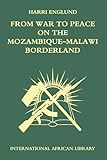From War to Peace on the Mozambique-Malawi Borderland / Harri Englund.
Material type: TextSeries: International African Library : IALPublisher: Edinburgh : Edinburgh University Press, [2022]Copyright date: ©2001Description: 1 online resource (232 p.)Content type:
TextSeries: International African Library : IALPublisher: Edinburgh : Edinburgh University Press, [2022]Copyright date: ©2001Description: 1 online resource (232 p.)Content type: - 9780748615773
- 9780585443874
- 305.89679 21
- online - DeGruyter
- Issued also in print.
| Item type | Current library | Call number | URL | Status | Notes | Barcode | |
|---|---|---|---|---|---|---|---|
 eBook
eBook
|
Biblioteca "Angelicum" Pont. Univ. S.Tommaso d'Aquino Nuvola online | online - DeGruyter (Browse shelf(Opens below)) | Online access | Not for loan (Accesso limitato) | Accesso per gli utenti autorizzati / Access for authorized users | (dgr)9780585443874 |
Frontmatter -- CONTENTS -- List of Maps, Tables and Figures -- Preface -- Introduction -- 1 Borders Drawn, Borders Crossed -- 2 The Paths to War -- 3 Refugees from Afar -- 4 Gendered Exile -- 5 Migrants amongst Refugees -- 6 Paradoxes of Repatriation -- 7 Value, Power and 'Social Capital' -- Epilogue: Borderland Revisited -- Appendix -- Notes -- Bibliography -- Index
restricted access online access with authorization star
http://purl.org/coar/access_right/c_16ec
From War to Peace on the Mozambique-Malawi Borderland is the first full-length ethnography to tell villagers' stories from war to peace in Mozambique. Extended case studies of particular villages and families on the Mozambique-Malawi borderland form the core of the book. While tracing their paths to war, exile and post-war reconstruction, the book reveals the human face of national and transnational crises. This detailed study takes the reader beyond the stereotypes which often accompany interventions into humanitarian catastrophes. The villagers in this book are not nameless victims but persons with social relationships; participants, in their own way, in the histories of colonialism, nationalism, labour migration, guerrilla war, exile, repatriation and, most recently, liberal democracy.A major contribution of the book is to show how changing historical circumstances have variously pitted villagers against one another and fostered co-operation. Questions of trust, moral value and legitimate authority inform ethnographic description, leading to an innovative critique of current analytical approaches to social capital. Those interested in humanitarian catastrophes, African politics, refugee studies and development studies will be inspired by its detailed rebuttal of stereotypes which continue to represent Africans as helpless victims.
Issued also in print.
Mode of access: Internet via World Wide Web.
In English.
Description based on online resource; title from PDF title page (publisher's Web site, viewed 02. Mrz 2022)


